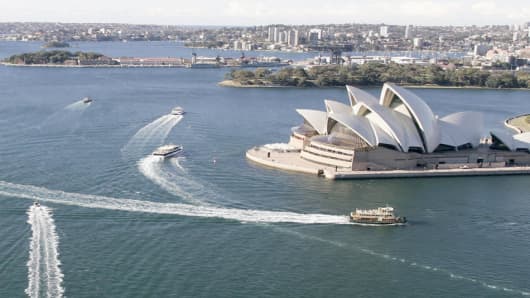Australia's central bank kept interest rates steady at a 12-year high of 7.25 percent on Tuesday, pointing to a slowdown in demand which could mean a further tightening is not needed.
In a brief statement following its monthly policy meeting, Reserve Bank of Australia (RBA) Governor Glenn Stevens acknowledged inflation would be high in the short term, but looked for a gradual fall over time as demand cooled.
"In order to reduce inflation over time, growth in aggregate demand needs to be significantly slower than it was in 2007," said Stevens. "Evidence is accumulating that this is occurring. The Board's current assessment is that demand growth will remain moderate this year."
The statement was taken as less hawkish than many had expected, so the Australian dollar retreated while bonds gained as the market priced in less risk of further rate increases.
"You're left with the strong sense the Reserve Bank's on hold for a prolonged period." said Rory Robertson, interest rate strategist at Macquarie.
"Whether the next move is up or down will depend significantly on the extent to which the global credit crunch intensifies or subsides from here."
Considerable Uncertainty
The central bank hiked rates in February and March as it battled to control inflation in a booming economy.
Since then signs have grown that the substantial tightening of the past was working to cool red-hot domestic demand with retail sales falling, credit growth waning and home sales off.
Yet, price pressures are still all too evident with the cost of everything from food to fuel, health and rents rising. Core inflation alarmed by accelerating to a 17-year high of 4.2 percent in the first quarter, uncomfortably far above the RBA's 2 to 3 percent target band.
This meant there was "considerable uncertainty" about the outlook for demand and inflation, said the RBA's Stevens.
"Should demand not slow as expected or should expectations of high ongoing inflation begin to affect wage and price setting, that outlook would need to be reviewed."
Tuesday's steady decision was welcomed by Australia's Labor government's Treasurer, Wayne Swan, who delivers his first budget next week after the previous Liberal government was swept out of power last year.
Swan has made controlling inflation the centrepiece of his budget, vowing to slash government spending and run frugal surpluses of 1.5 percent of gross domestic product (GDP).
A Close-Run Affair
A Reuters poll of 24 economists taken last week showed none had expected a hike at this meeting and most thought the domestic economy would slow enough this year to keep rates on hold.
Still, if rates go anywhere in the next few months it will likely be upward. Employment remains healthy, with the jobless rate of 4.1 percent near 33-year lows, and incomes are set to get a sizable boost from tax cuts in next week's budget.
Business investment is being fuelled by strong demand for Australia's resources from China, India and the rest of Asia. Indeed, the insatiable appetite for coal and iron ore should result in massive price increases for these major Australian exports, delivering a huge windfall to the economy.
National Australia Bank estimates the increases will add A$54 billion ($51 billion) to Australia's export earnings in the year ahead. Such an outcome would effectively wipe out the country's perennial trade deficit and represent a boost of 4.9 percent of GDP.
Figures on Tuesday showed the trade deficit narrowed to a smaller-than-expected A$2.74 billion in March, as exports climbed 4.4 percent. This boost to the terms of trade is a major reason Australia has weathered the global credit squeeze relatively unharmed and why rates here have been rising even as the United States and many other countries were busy cutting. "There's still a tightening bias," said Michael Blythe, chief economist at Commonwealth Bank.
"Whether they deliver on that will depend very much on how the economic data plays out. Certainly any sign that demand is starting to recover would put another move onto the agenda."


